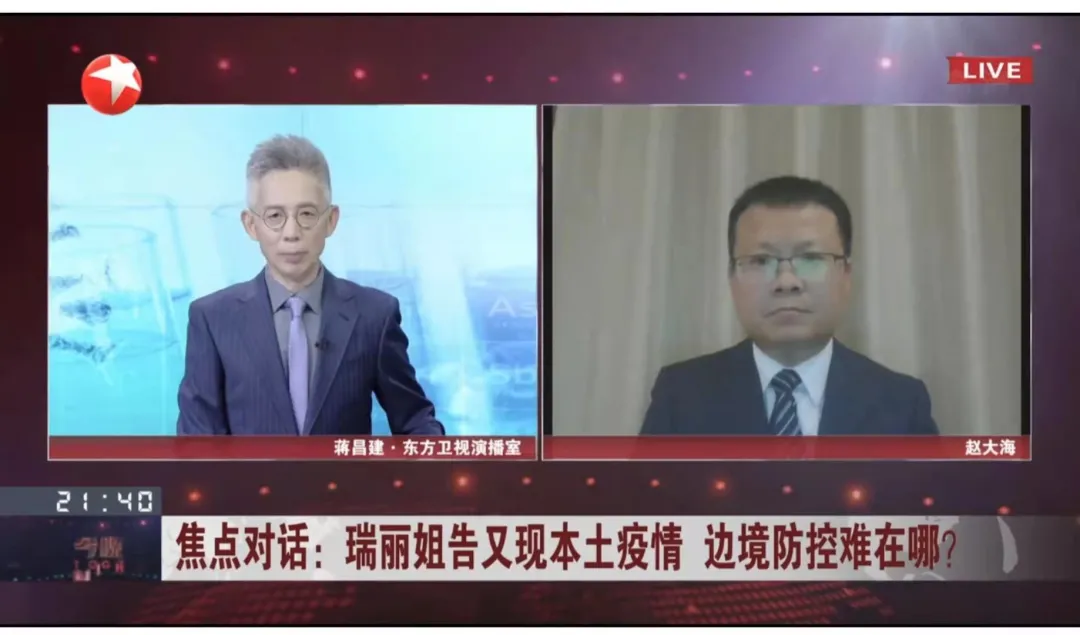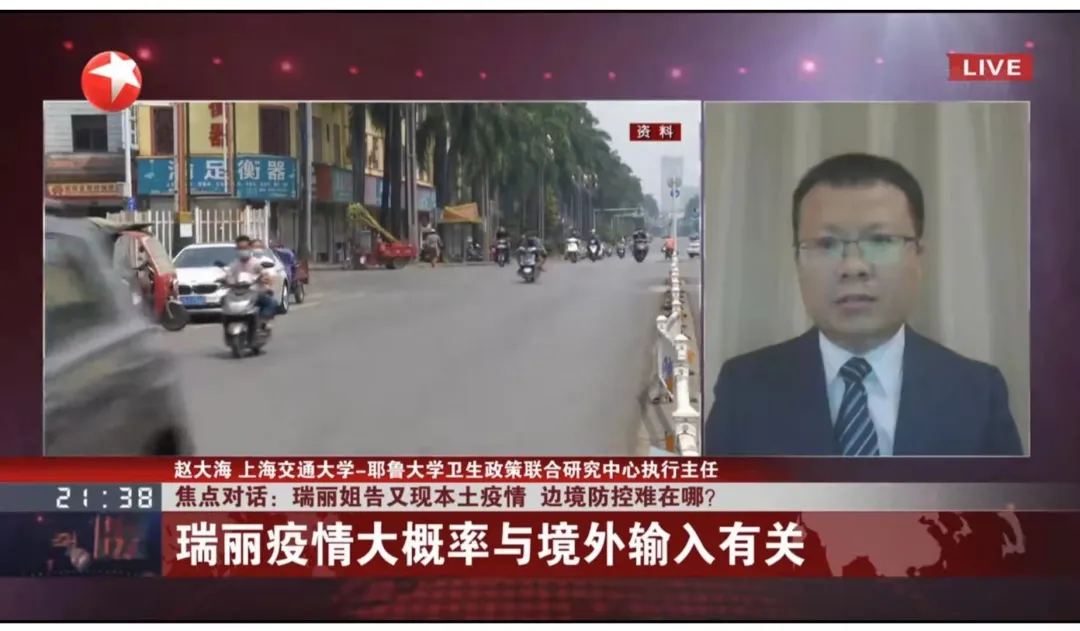上海交大赵大海教授接受东方卫视专访:云南瑞丽最新的新冠疫情警示边境地区疫情防控的严峻性

上海交通大学国际与公共事务学院教授、博士生导师,上海交通大学-耶鲁大学卫生政策联合研究中心执行主任赵大海,自新冠肺炎疫情暴发以来,对于新冠疫情暴发、防控以及卫生政策第38次接受上海电视台专访,也是第96次接受央视、上视专访。2021年7月5日,赵大海接受东方卫视专访,在《今晚》节目,就瑞丽最新散发的新冠疫情进行了解释和评论。现将访谈内容摘录如下。
主持人:相关的话题,马上来连线上海交通大学-耶鲁大学卫生政策联合研究中心执行主任赵大海。这次发现的三例本土病例,均是在瑞丽常态化的全员核酸检测中发现的,刚才的那个片子说,还不排除随着检查的进一步的深入,会有新的增加病例的可能。其实谈到瑞丽,我们并不陌生,在过去的一些散发的案例当中,这个地方的名字曾经出现过,所以您怎么看这次的瑞丽本土疫情的发展态势?
赵大海:这三例病例均是通过常态化的核酸检测主动发现的,这在很大程度上提示本轮新冠疫情仍然处于传播的较早期,相对而言更有利于疫情的控制。与此同时,随着瑞丽已采取了一系列的果断的防控措施,我相信瑞丽本轮新冠疫情会在比较短的时间之内得到全面的控制。

主持人:目前看您还是比较乐观的,当然乐观的基础就在于我们常态化防疫,同时也采取了一些非常重要的严密的措施,那我们现在也知道,受到境外疫情形势严峻的影响,近期通过云南入境的人员开始增多。那么在您看来,瑞丽本轮的疫情是否和境外输入有关?
赵大海:虽然本轮疫情的流行病学调查的具体信息还没有完整的披露,但我们还是有足够的依据,能判断出本轮疫情确实是与境外输入相关的,这也是给当地和全国其他地区的一个重要的警示,境外人员的入境还是要继续加强和落实严格的疫情管控措施。
主持人:您刚才也特别说在最近的一段时间里,不到一年的时间,瑞丽已经几次出现了本土的疫情,这也再次告诉我们边境地区也好,或者有口岸的地区也好,确实承担着比较重的防疫任务。很多人看到疫情的新闻,很自然的就像我刚才向您提问的那样想,怎么这次又是瑞丽,所以从您专业的角度来讲,对于边境的防控,我们怎么能够真正做到,把防控的篱笆给扎牢,并且要警钟长鸣,除了警钟长鸣之外,还真的是要做到万无一失,怎么才能做到?
赵大海:首先,边境地区在进行疫情防控的时候,特别是对于入境人员的检测,包括管控的过程当中,确实存在着非常大的难度。瑞丽之所以最近几次出现散在的疫情暴发就是一个很好例证。对于真正的落实防控而言,现在随着各个国家与中国的边境通商的部分恢复,对于中国的疫情防控,特别是中国边境地区的防控,我们现在能够做的一方面是进一步加强疫情的管控,所有的入境人员严格地采取疫情管控的常规措施,比如身体检查,比如类似于中国健康码等方式的检查。还有一个方面,就是尽快在边境地区完成新冠疫苗的接种工作,使自己这边的新冠疫情的防控屏障得以尽快全面建立起来。只有这样,边境地区的疫情的防控的压力会在短时间之内得到缓解。
供稿:国务学院
日期:2021年7月6日
Dahai ZHAO’s Exclusive Interview with ShanghaiTV: The latest cases in Ruili, Yunnan warn the severity of China’s border city prevention
Dahai Zhao, a doctoral supervisor at the School of International and Public Affairs of Shanghai Jiao Tong University and Executive Director of Shanghai Jiao Tong University-Yale University Joint Research Center for Health Policy, has been interviewed by ShanghaiTV for the 38st time (the 96st time by CGTN / ShanghaiTV) since the COVID-19 pandemic. On 5 July, 2021, Zhao commented on the newly sporadic COVID-19 epidemic in Ruili on “Tonight” of Shanghai TV.
Anchor: All three local cases were detected in Ruili's regular full-scale nucleic acid tests. There is a possibility of additional cases as tests are carried out. In fact, when it comes to Ruili, we are not unfamiliar. The name of this place has appeared in some of the cases that have circulated in the past. How do you see the development of the local epidemic in Ruili?
ZHAO: All three cases were actively discovered through normal nucleic acid testing, which to a large extent indicates that this round of COVID-19 is still in a relatively early stage of transmission, which is relatively conducive to the control of the epidemic. At the same time, as Ruili has taken a series of decisive prevention and control measures, I believe that this round of COVID-19 in Ruili will be fully controlled within a relatively short period of time.
Anchor: At present, you are quite optimistic. Of course, the basis of optimism lies in the fact that we have carried out regular epidemic prevention and taken some very important strict measures. Due to the severe situation of the epidemic outside China, the number of people entering the country through Yunnan has been increasing recently. So in your opinion, is this round of epidemic in Ruili related to foreign imports?
ZHAO: Although the details of the epidemiological investigation of this outbreak have not been fully disclosed, there is sufficient evidence to conclude that this outbreak is indeed related to foreign imports. It is also an important warning to the local and other parts of the country that people entering the country from abroad should continue to strengthen and implement strict epidemic control measures.
Anchor: You just said in particular that in less than a year, Ruili has seen several outbreaks of local epidemics. This once again tells us that border areas or port areas do bear a relatively heavy epidemic prevention task. For border prevention and control, how can we really do the prevention and control of the fence to strengthen the alarm?
ZHAO: First of all, in the prevention and control of the epidemic in border areas, especially in the detection and control of entry personnel, it is indeed very difficult. Ruili's recent sporadic outbreaks are a good example. In terms of the actual implementation of the prevention and control, one of the things that we can do now, with the partial resumption of border trade between various countries and China, is to further strengthen the control of the epidemic. All those who enter the country are strictly subject to routine measures for epidemic control, such as physical check-ups and examinations similar to the China Health Code. Another aspect is to complete the vaccination of the COVID-19 vaccine in the border areas as soon as possible, so that the domestic prevention and control barrier of the COVID-19 disease can be established as soon as possible. Only in this way, the pressure of prevention and control of the epidemic in the border areas will be alleviated in a short time.
Contributor: SIPA, SJTU
Date: July 6, 2021

